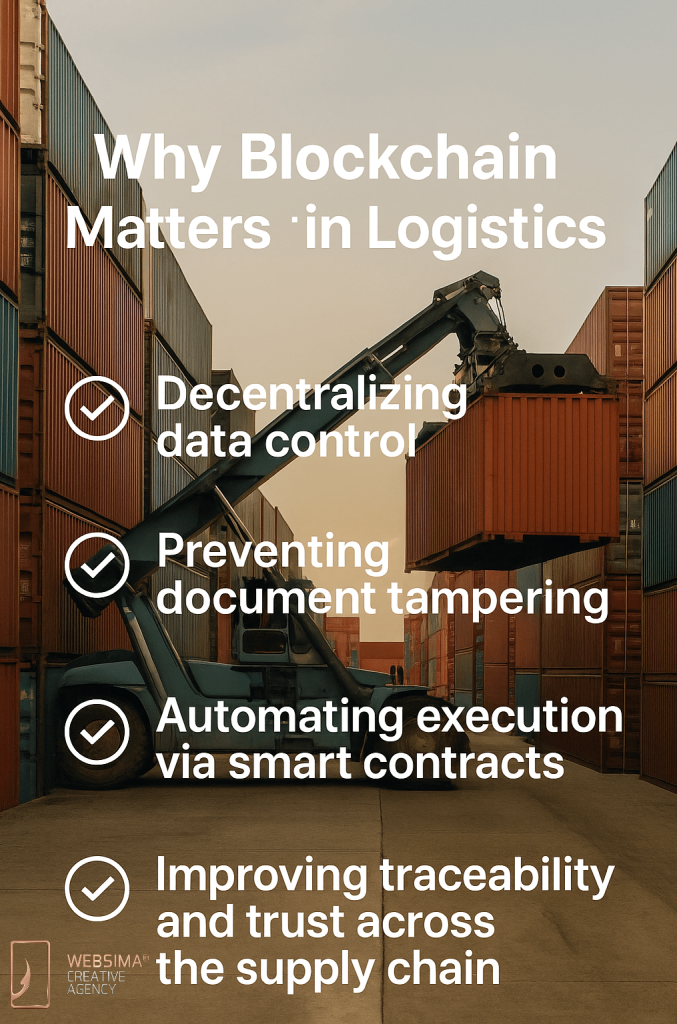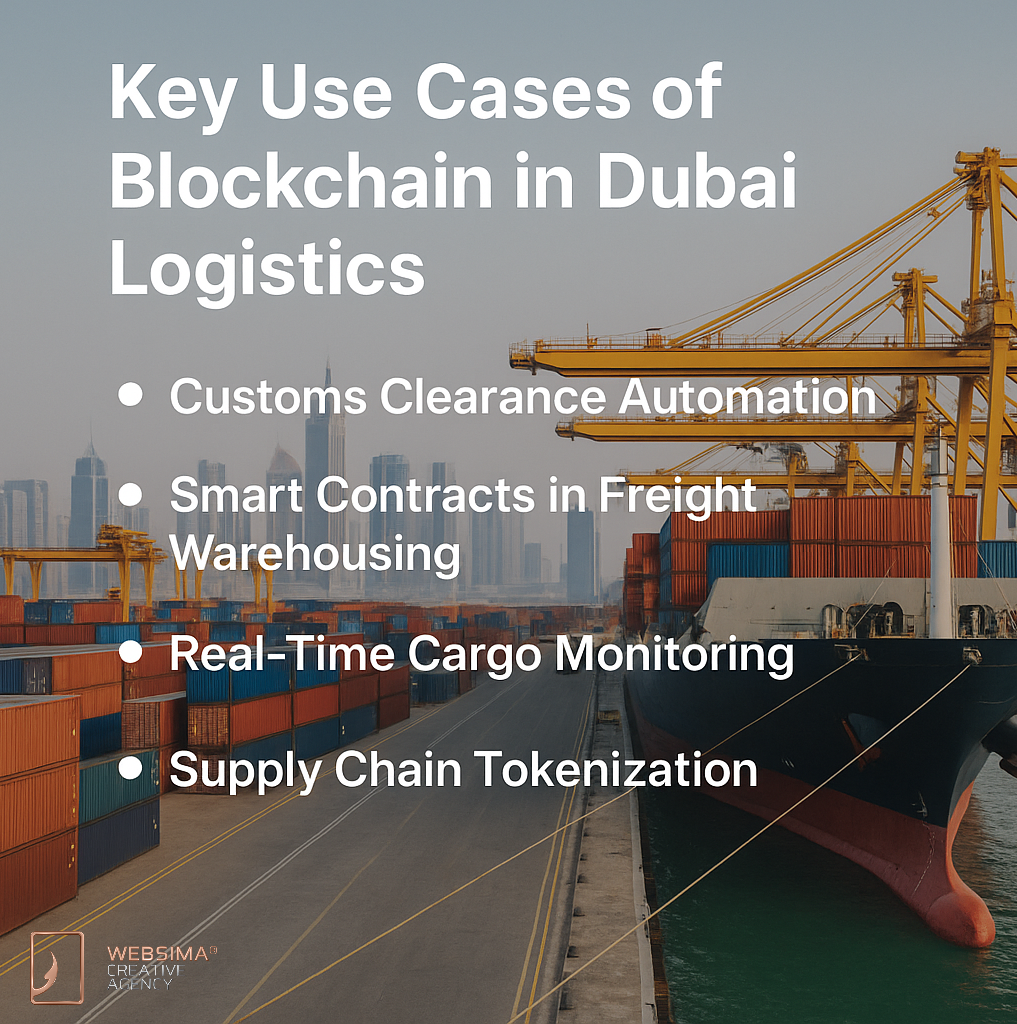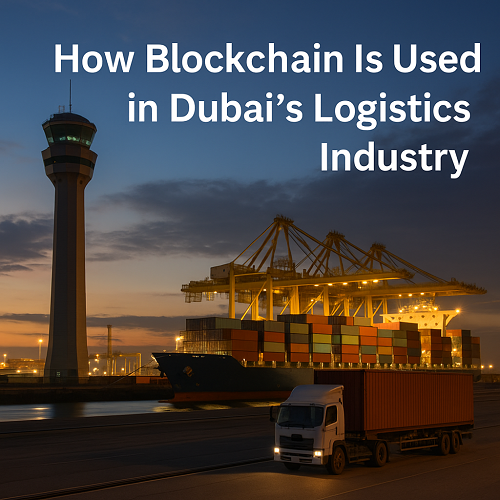Table of Contents
- Introduction: Dubai as a Global Trade Hub
- Why Blockchain Matters in Logistics
- Key Use Cases Where Blockchain Transforms Dubai Logistics
- Dubai Government Blockchain Initiatives in Logistics
- How Blockchain Improves Operational Efficiency
- Private Sector Use Cases in Dubai
- Challenges and Risks to Consider
- Regulatory Frameworks and Blockchain Governance
- Case Study: Blockchain at Dubai Customs
- Future Outlook: What Lies Ahead
- Common Mistakes Logistics Companies Make
- Fees, Setup, and Onboarding for Blockchain Logistics
- Frequently Asked Questions
- Partner with Websima for Blockchain Logistics Integration
Introduction: Dubai as a Global Trade Hub
Dubai’s strategic location and infrastructure have long positioned it as a logistics powerhouse connecting Europe, Asia, and Africa. With Jebel Ali Port, one of the world’s largest, and Dubai International Airport, among the busiest for air cargo, the city facilitates vast trade flows daily. Today, blockchain transforms Dubai logistics by bringing speed, security, and automation to every stage of cargo movement. However, it is important to know the challenges facing blockchain startups in UAE, before making any investment decision.
According to official UAE government figures, non-oil foreign trade reached AED 3.5 trillion in 2023, breaking all previous records (source). To support this growth, Dubai is embracing blockchain to resolve inefficiencies such as manual processing, opaque supply chains, and fraud.
: &
People, listen this is very important to consider. Because port employees need to understand that your job is not just about shipping products. We all know you will not have the courage to report what has been actually… pic.twitter.com/suSzYFBIPi
— ȺɾìҽӀ (@Prolotario1) October 2, 2024
Why Blockchain Matters in Logistics

Legacy systems in logistics rely heavily on paperwork, intermediaries, and inconsistent communication across borders. Blockchain solves these key issues by:
- Decentralizing data control
- Preventing document tampering
- Automating execution via smart contracts
- Improving traceability and trust across the supply chain
These innovations are central to Dubai’s broader Blockchain Strategy 2025, which aims to make the emirate a fully digitized logistics and trade hub.
Key Use Cases Where Blockchain Transforms Dubai Logistics

Customs Clearance Automation
In 2024, Dubai Customs launched a blockchain-based trade platform that digitizes clearance processes, shortens delays, and eliminates document fraud.
Real-Time Cargo Monitoring
IoT sensors paired with blockchain ensure that shipment conditions (e.g., temperature, location, shock) are recorded in real time and made tamper-proof, increasing reliability for sensitive cargo like pharmaceuticals or electronics.
Smart Contracts in Freight and Warehousing
Automated smart contracts handle:
- Immediate payments upon delivery confirmation
- Access controls for bonded warehouses
- Automated dispute resolution between stakeholders
Supply Chain Tokenization
Dubai is piloting RWA (Real-World Asset) tokenization to fractionalize port access, shipping containers, and storage units—enabling micro-investments and instant financing on the blockchain.
Dubai Government Blockchain Initiatives in Logistics
| Initiative | Entity | Purpose |
| Dubai Customs Blockchain Platform | Dubai Customs | Automates cross-border documentation |
| Digital Silk Road | Dubai Chamber | Secures global trade data via blockchain |
| CARGOES by DP World | DP World | Integrates smart logistics & blockchain |
| Dubai Trade | Government + DP World | Connects all shipping and logistics stakeholders on a single digital platform |
How Blockchain Improves Operational Efficiency
| Function | Traditional Approach | Blockchain-Enabled |
| Bill of Lading | Paper, easy to forge | Digital, tamper-proof |
| Customs Clearance | Manual checks | Automated with validation |
| Cargo Visibility | Fragmented systems | Unified tracking |
| Payment Settlements | Delayed | Instant via smart contracts |
| Regulatory Compliance | Document-heavy | Smart audit trails |
Private Sector Use Cases in Dubai
- Emirates SkyCargo: Tested blockchain-based verification for medical shipments.
- Aramex: Explored last-mile blockchain logistics via dynamic delivery authentication.
- DP World: Integrating blockchain across global port operations through its CARGOES platform.
Challenges and Risks to Consider
- Regulatory ambiguity outside DIFC and ADGM
- High onboarding costs for legacy logistics firms
- Data privacy concerns in decentralized networks
- Smart contract bugs and lack of code audits
Addressing these challenges requires coordination between developers, logistics operators, and UAE regulators.
Regulatory Frameworks and Blockchain Governance
Key regulatory bodies overseeing blockchain in logistics:
- Virtual Assets Regulatory Authority (VARA) – Supervises blockchain platforms involving asset tokenization.
- Abu Dhabi Global Market (ADGM) – Provides legal support and sandbox environments for trade startups.
- Dubai International Financial Centre (DIFC) – Enables common-law-based smart contract enforcement.
- Dubai Chamber of Digital Economy – Advocates blockchain-backed global trade corridors.
Case Study: Dubai Customs Blockchain Launch
Launched: July 2024
Objective: Replace paper documentation and reduce fraud
Achievements:
- 150,000+ shipments processed
- Clearance times cut by 50%
- Integration with 30+ government and private entities
- Trade documentation errors reduced significantly
Source: Dubai Media Office
Future Outlook: What Lies Ahead?
Dubai’s 2030 goals include:
- Mandatory blockchain-based documentation for all ports
- AI-powered trade analytics from blockchain datasets
- DAO-style port operations
- Green logistics credits tracked on-chain
A McKinsey report projects blockchain could reduce global freight costs by 20% by 2030, aligning perfectly with Dubai’s vision.
Common Mistakes to Avoid
- Skipping regulatory licensing for blockchain projects
- Underestimating integration costs with IoT devices
- Ignoring legal enforceability of smart contracts
- Over-customizing closed-source blockchain tools
Fees, Setup, and Onboarding for Blockchain Logistics
| Component | Approx. Cost (AED) |
| Smart Contract Audit | 10,000 – 25,000 |
| Blockchain Platform Development | 25,000 – 70,000 |
| Dubai Trade Integration | 15,000 – 40,000 |
| Tokenization Setup | 30,000+ (if asset-backed) |
| VARA Licensing | Based on activity scope |
Frequently Asked Questions
Q: Is blockchain legally recognized in Dubai logistics?
Yes. It is recognized by Dubai Customs, DIFC, and ADGM.
Q: Does every logistics company need VARA approval?
Only those offering tokenized assets or using blockchain for financial settlements.
Q: What blockchains are popular in UAE logistics?
Hyperledger Fabric, Quorum, Ethereum (private forks), and Corda.
Q: How fast can blockchain reduce trade clearance time?
From 3–5 days to under 6 hours in some Dubai Customs cases.
Bottomline
Dubai’s logistics sector is undergoing a powerful digital transformation — and blockchain is proving to be one of its most critical enablers. As a global trade hub processing trillions in non-oil commerce, the emirate cannot afford delays, fraud, or inefficiencies in its supply chains. By adopting blockchain, Dubai is building a logistics ecosystem that is faster, smarter, more transparent, and globally interoperable. That would make blockchain based logistic services, one of the top blockchain startup ideas for UAE entrepreneurs.
From real-time cargo monitoring and smart contract automation to the tokenization of physical logistics infrastructure, blockchain transforms Dubai logistics far beyond theoretical innovation. It’s already redefining how customs, ports, and freight operators conduct business daily.
As we look toward 2030, Dubai’s vision is clear: to become the world’s most advanced and trusted logistics platform. And blockchain will be the digital backbone that supports it.
If you’re in logistics and not already exploring blockchain, you’re not just behind the curve — you’re risking irrelevance in a market that’s evolving faster than ever.
Partner with Websima to Build Blockchain-Powered Logistics Solutions
Dubai is rapidly digitizing its logistics infrastructure—and blockchain is at the core of this revolution. Whether you’re a freight forwarder, port operator, warehouse manager, or global supply chain strategist, Websima can help you stay ahead.
We specialize in:
- Smart contract development for trade
- Blockchain-IoT integration
- Customs-ready blockchain platforms
- VARA-compliant digital asset systems
- Tokenization of real-world logistics infrastructure
Let’s future-proof your logistics operations.
Contact Websima now to discuss your custom blockchain logistics strategy.





